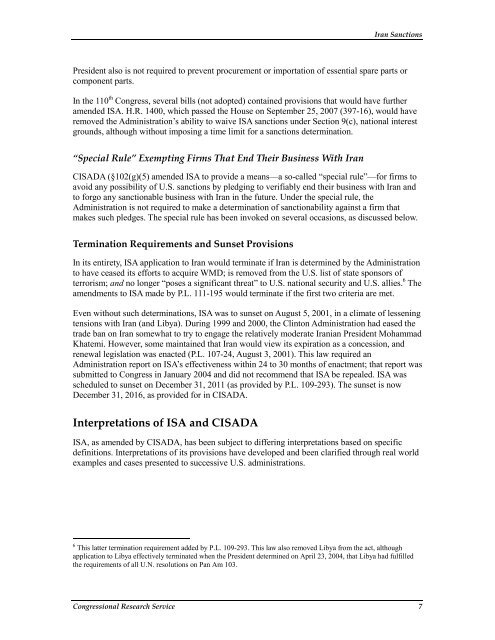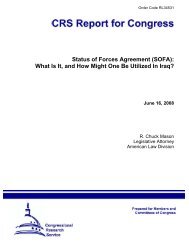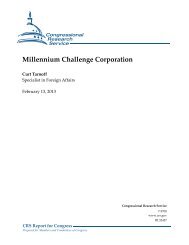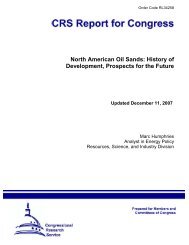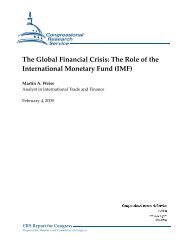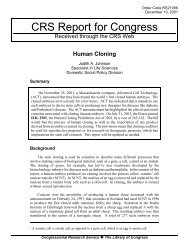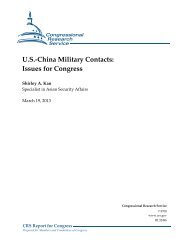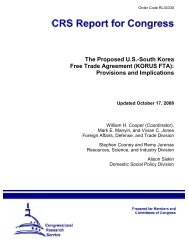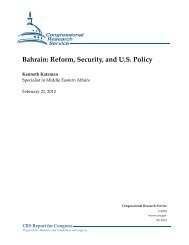Iran Sanctions - Foreign Press Centers
Iran Sanctions - Foreign Press Centers
Iran Sanctions - Foreign Press Centers
Create successful ePaper yourself
Turn your PDF publications into a flip-book with our unique Google optimized e-Paper software.
<strong>Iran</strong> <strong>Sanctions</strong><br />
President also is not required to prevent procurement or importation of essential spare parts or<br />
component parts.<br />
In the 110 th Congress, several bills (not adopted) contained provisions that would have further<br />
amended ISA. H.R. 1400, which passed the House on September 25, 2007 (397-16), would have<br />
removed the Administration’s ability to waive ISA sanctions under Section 9(c), national interest<br />
grounds, although without imposing a time limit for a sanctions determination.<br />
“Special Rule” Exempting Firms That End Their Business With <strong>Iran</strong><br />
CISADA (§102(g)(5) amended ISA to provide a means—a so-called “special rule”—for firms to<br />
avoid any possibility of U.S. sanctions by pledging to verifiably end their business with <strong>Iran</strong> and<br />
to forgo any sanctionable business with <strong>Iran</strong> in the future. Under the special rule, the<br />
Administration is not required to make a determination of sanctionability against a firm that<br />
makes such pledges. The special rule has been invoked on several occasions, as discussed below.<br />
Termination Requirements and Sunset Provisions<br />
In its entirety, ISA application to <strong>Iran</strong> would terminate if <strong>Iran</strong> is determined by the Administration<br />
to have ceased its efforts to acquire WMD; is removed from the U.S. list of state sponsors of<br />
terrorism; and no longer “poses a significant threat” to U.S. national security and U.S. allies. 6 The<br />
amendments to ISA made by P.L. 111-195 would terminate if the first two criteria are met.<br />
Even without such determinations, ISA was to sunset on August 5, 2001, in a climate of lessening<br />
tensions with <strong>Iran</strong> (and Libya). During 1999 and 2000, the Clinton Administration had eased the<br />
trade ban on <strong>Iran</strong> somewhat to try to engage the relatively moderate <strong>Iran</strong>ian President Mohammad<br />
Khatemi. However, some maintained that <strong>Iran</strong> would view its expiration as a concession, and<br />
renewal legislation was enacted (P.L. 107-24, August 3, 2001). This law required an<br />
Administration report on ISA’s effectiveness within 24 to 30 months of enactment; that report was<br />
submitted to Congress in January 2004 and did not recommend that ISA be repealed. ISA was<br />
scheduled to sunset on December 31, 2011 (as provided by P.L. 109-293). The sunset is now<br />
December 31, 2016, as provided for in CISADA.<br />
Interpretations of ISA and CISADA<br />
ISA, as amended by CISADA, has been subject to differing interpretations based on specific<br />
definitions. Interpretations of its provisions have developed and been clarified through real world<br />
examples and cases presented to successive U.S. administrations.<br />
6 This latter termination requirement added by P.L. 109-293. This law also removed Libya from the act, although<br />
application to Libya effectively terminated when the President determined on April 23, 2004, that Libya had fulfilled<br />
the requirements of all U.N. resolutions on Pan Am 103.<br />
Congressional Research Service 7


